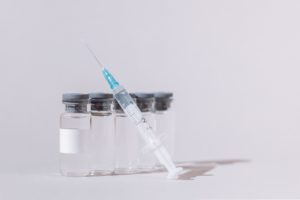What do you do when you experience an accidental needle stick?
There is another threat to the public, including people who do not inject drugs. It is a small and silent threat, a byproduct of the drug use epidemic: discarded or found used syringes. It is not only syringes used for illicit drugs; needles are used for steroid injection, health maintenance and cosmetic improvements. All have a potential for pathogen sharing.
Yavapai County has a lot of wide-open spaces for hiking, picnicking, biking and camping. There are hundreds of beautiful trails for us to enjoy. Every year we host annual clean-up events of these spaces for continued enjoyment and use. It is not uncommon to find discarded syringes in these shared spaces.
Did you know HIV can survive in a discarded syringe for 42 days? When the temperature does not exceed 32 degrees, those germs can live longer. HIV is not the only virus that can survive in a discarded syringe. Hepatitis C, Hepatitis B, Syphilis, Rocky Mountain spotted fever, Epstein-Barr and other pathogens can survive, too. According to CDC data, healthcare workers experience 385,000 reported needlestick and sharps injuries annually. It is estimated that one in three law enforcement officers will experience a needle stick during their professional career. That is a high number for our country’s finest. There is no cure for HIV or Hepatitis B, and the cure for Hepatitis C is expensive. One such medication, Epculusa, costs about $94,500 for a 12-week treatment.
What do you do when you experience an accidental needle stick?
- Wash the needlestick area thoroughly with soap and water (hand sanitizer is not the same).
- Immediately seek medical treatment.
- If you have the syringe and do not have a container to dispose of it in a safe manner, you put it in a can, jar or bottle and close it. You can bring it with you to meet with a healthcare provider for proper disposal.
- Pay attention to where you were stuck and how deep the needle went in.
Even though HIV is treatable and no longer the death sentence it once was, we still want to prevent people from becoming HIV+. There is a pharmaceutical tool today that can stop HIV in its tracks! That’s right, there are medications that will stop HIV from hijacking a person’s immune system. We’ve used these medications for years and know they are effective and safe. The tool is called PEP – Post-exposure Prophylaxis. At Northland Cares, we keep these medications in-house in the event of an exposure. For PEP to be effective, a person needs to get these medications within 72 hours of their exposure to HIV. The sooner we can get these medications to the exposed person, the more effective they are at stopping transmission of the virus.
Northland Cares has implemented an on-call weekend and holiday Emergency PEP Program. We are the first clinic in the state of Arizona to offer this service. Our trained staff members are ready to be dispatched to a hospital, clinic or secure public space to respond to a public health emergency.
What happens when you call for Emergency PEP?
If the exposure occurs during our business hours, call one of our offices Monday through Friday from 8:30 a.m. to 4:30 p.m. For Prescott, call 928-776-4612. For Cottonwood, call 928-649-0833.
If the exposure happens outside of our normal business hours, contact us at our on-call weekend and holiday number, 928-910-6707.
You will meet with one of our trained outreach staff members who will provide you with a new patient packet and gather information such as your name, insurance information, health history, current medications, allergies to medication classes, etc.
You will have an in-person or a telephonic meeting with our provider.
We will provide you with a one-week regimen of PEP medications.
Our PrEP and PEP Navigator will follow up with you and help you obtain the remaining three weeks of medications required to stop you from becoming HIV+.
If you don’t have insurance, we are always able to get these medications covered.
We will schedule two follow-up visits to ensure the medication was effective at stopping the virus.
PEP medications are taken daily for 28 days for optimum efficacy. It is critical that they are taken as prescribed. Remember, the closer to the time of exposure the more effective they are at stopping virus transmission. Do not delay in getting immediate help.
Accidental needle sticks and sharps injuries are not the only reason for PEP. Condom breakage with someone of an unknown status and being the victim of a sexual assault by someone of an unknown status are also reasons to seek PEP medications. We are here for you. No judgement. Just help!
I would like to thank everyone who voted for us to be the Non-Profit of the Year in the Quad Cities 2021. We appreciate your continued support. Northland Cares is a 501(c)3 non-profit organization that relies on donations and grant funding. Have a safe time enjoying our shared community spaces. Call us if you encounter a discarded syringe! QCBN
By Hedda Fay
Hedda Fay is the community outreach and program developer for Northland Cares. In a former life, she worked in law enforcement and public mental health. Her passion today is educating people about their sexual health and prevention services to the community. Northland Cares is located at 3112 Clearwater Drive, Ste. A, in Prescott. For more information, call 928-776-4612.






Leave a Reply